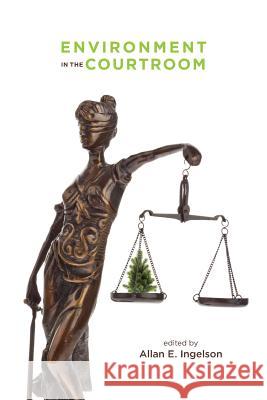Environment in the Courtroom » książka
topmenu



Environment in the Courtroom
ISBN-13: 9781552389850 / Angielski / Miękka / 2019 / 824 str.
Environment in the Courtroom
ISBN-13: 9781552389850 / Angielski / Miękka / 2019 / 824 str.
cena 243,89
(netto: 232,28 VAT: 5%)
Najniższa cena z 30 dni: 242,90
(netto: 232,28 VAT: 5%)
Najniższa cena z 30 dni: 242,90
Termin realizacji zamówienia:
ok. 22 dni roboczych.
ok. 22 dni roboczych.
Darmowa dostawa!
Kategorie:
Kategorie BISAC:
Wydawca:
University of Calgary Press
Język:
Angielski
ISBN-13:
9781552389850
Rok wydania:
2019
Ilość stron:
824
Waga:
1.22 kg
Wymiary:
20.83 x 22.61 x 4.57
Oprawa:
Miękka
Wolumenów:
01
Dodatkowe informacje:
Wydanie ilustrowane
- Preface
- Section 1: Key Environmental Concepts and the Unique Nature of Environmental Damage
- 1. Sustainable Development Under Canadian Law Paul Halley and Pierre-Olivier DesMarchais
- 2. A Precautionary Tale: Trials and Tribulations of the Precautionary Principle. Chris Tollefson
- 3. Ecosystem Management: It's Imperative … Whatever It Is Michael M. Wenig
- 4. Public Nuisance: Public Wrongs and Civil Rights of Action Alastair R. Lucas, Q.C.
- 5. The Incorporation of an Environmental Ethic in the Courtroom Heather McLeod-Kilmurray
- 6. The Intersection of Human Rights Law and Environmental Law Nickie Nikolaou
- 7. Practical Engagement with Indigenous Legal Traditions on Environmental Issues: Some Questions Hadley Friedland
- 8. The Legal Concept of Sustainability Natasha Affolder
- 9. How Legal Design May Constrain the Power of Law to Implement Environmental Norms: The Case of Ecological Integrity in Canada's National Parks Shaun Fluker
- 10. Applying International Law to Canadian Environmental Law Charles-Emmanuel
- 11. The Role of International Environmental Law in Canadian Courts Phillip M. Saunders, Q.C.
- 12. Assessing Environmental Damages: How Much is Beauty Worth in Dollars? Giorilyn Bruno
- Section 2: Environmental Prosecutions
- 13. The Exercise of Prosecutorial Discretion: Challenges to Environmental Prosecutions Alex Ikejiani
- 14. Regulatory Negligence in Environmental Law Lynda Collins and Jasmine van Schouwen
- 15. Strategic Decisions in Environmental Prosecutions Paul McCulloch and Danielle Meuleman
- 16. Federal vs. Provincial Crowning Susan McRory
- 17. Who Should Prosecute: Intragovernmental Aspects Martin Z.P. Olszynski
- 18. Science and Advocacy Heather McLeod-Kilmurray
- 19. Private Prosecutions Revisited: The Continuing Importance of Private Prosecutions in Protecting the Environment John Swaigen, Albert Koehl, and Charles Hatt
- 20. Due Diligence in Environmental Offences Rhonda M. Vanderhoek
- 21. Certain Defenses in Criminal Law of the Environment Jean Piette
- 22. Aboriginal Law in the Context of Regulatory Prosecutions Cheryl Sharvit
- Section 3: Sentencing and Environmental Offences
- 23. Environmental Sentencing: Making the Best of a Blunt Instrument Judge Barry Stuart
- 24. Holding Directors and Officers Liable for Environmental Problems: Sentencing and Regulatory Orders Dianne Saxe and Meredith James
- 25. The Enforcement of Environmental Law through the Use of Administrative Penalties Jean Piette
- 26. Creative Sentencing in Environmental Prosecutions, the Canadian Experience: An Overview John D. Cliffe, Q.C.
- 27. Creative Sentencing: The Experience ""Down Under""Sharon Mascher
- 28. Creative Environmental Sentencing: The Corporate Perspective Allan Ingelson
- 29. Environmental Non-Governmental Organizations and Creative Sentencing: Perspectives and Roles Cindy Chiasson
- 30. Negotiating Sentences Peter J. Craig
- 31. Creative Sentence Negotiation: Looking Beyond Deterrence Paul Adams
- 32. The Law and Economics of Environmental Harm: A Primer and Update for Environmental Sentencing (Parts I & II) Martin Olszynski and Peter Boxall
- 33. The Law and Economics of Environmental Harm: A Primer and Update for Environmental Sentencing (Parts III, IV &V) Peter Boxall and Martin Olszynski
- Section 4: Evidentiary Issues in Environmental Prosecutions and Hearings
- 34. Proving Causation: Scientific Certainty vs. Legal Burden of Proof Danielle Meuleman
- 35. Experts in Environmental Litigation Marc McAree, Robert Woon, and Anand Srivastava
- 36. Communication Between Lawyers and Experts Marc McAree, Robert Woon, and Anand Srivastava
- 37. Reporting Obligations to Third Parties Marc McAree, Robert Woon, and Anand Srivastava
- 38. Admissibility of Expert Evidence and Costs Marc McAree, Robert Woon, and Anand Srivastava
- 39. Experts Only Jim Bunting, Terri-Lee Oleniuk, and Sarah Powell
- 40. An Overview of Expert Evidence in Canada Gary A. Letcher and Andrea C. Akelaitis
- 41. Issues Respecting Expert Advisers, Expert Witnesses and Retaining Council Nicholas R. Hughes and Monika A. Sawicka
- 42. Continuity of Evidence and Remediation Advice for Investigators: Some Brief Comments John D. Cliffe, Q.C. and John S.G. Clark
- 43. Proving the Right to be Heard: Evidentiary Barriers to Standing in Environmental Matters Adam Driedzic
- 44. The Challenges of Gathering Expert Evidence by Private Individuals Asha James
- 45. Challenges in Using Aboriginal Traditional Knowledge in the Courts David Laidlaw
- 46. Privilege in Environmental Enforcement Erin Eacott
- 47. Judicial Notice of Climate Change Brenda Heelan Powell
- Section 5: Inspections and Enforcement Issues: On-site and in Court
- 48. The Art of Responsive Regulation: How Agencies Can Motivate Regulated Firms to Become Virtuous James Flagal
- 49. Regulatory Inspections: A Private Practitioner's Perspective Katia Opalka
- 50. Anatomy of Compliance Regime: Imitations of Action-A Regulator's Perspective Fred Maefs
- 51. Collecting Essential Evidence for Environmental Investigations and Prosecutions: Approaches to Legal Strategy and Associated Issues Jack D. Coop
- 52. Environmental Investigations: A Government Perspective Paul McCulloch
- 53. Recapitulation and Alternatives: Lessons Learned From a Hypothetical Case Study Jennifer Fairfax
- 54. Anatomy of Compliance Regime: Recapitulation and Alternative Lessons from the United States Jonathan Leo
- List of Contributors
- Index
1997-2026 DolnySlask.com Agencja Internetowa
Zobacz: Księgarnia Czeska | Wydawnictwo Książkowe Klimaty | Mapa strony | Lista autorów
KrainaKsiazek.PL - Księgarnia Internetowa
KrainaKsiazek.PL - Księgarnia Internetowa









